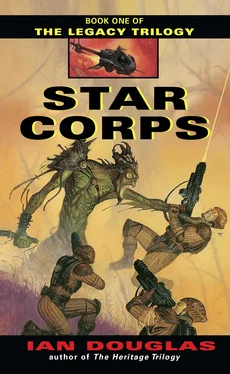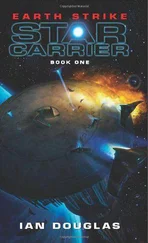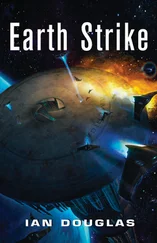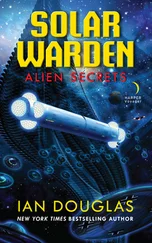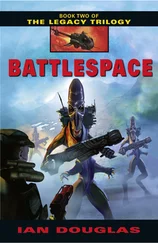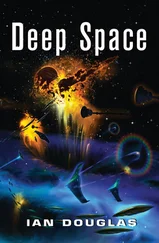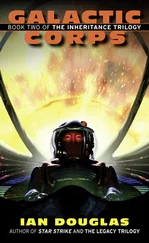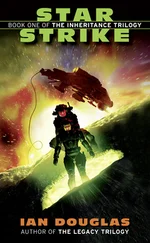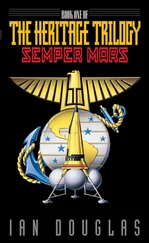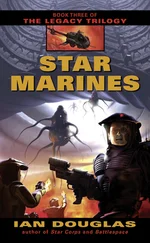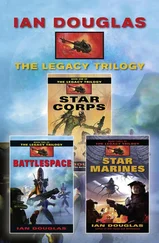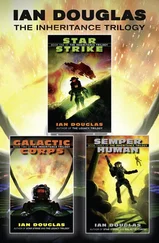Which reminded him …
“They want my whole constellation to go Earthside with me,” he said.
“I know Captain DeHavilland and Sergeant Major Tanaka are at Cydonia,” General Cassidy replied. “A C-5 has already been dispatched to bring them in. The rest of them are here at Prime, aren’t they?”
“Actually, sir, I was thinking of Cassius. He was seconded to Outwatch when I was assigned here. He’s been on Europa for eight months.”
“I don’t have any information about your sym, Colonel. But this is damned hot. I would imagine that Quantico has already made provisions to bring him back as well.”
If so, this assignment was hot, hotter than a class-four solar flare. The Corps was not in the habit of casually shuttling command constellations from Mars to Earth just for a briefing … and sure as Chesty Puller was a devil dog, it wasn’t in the habit of ferrying a lone AI symbiont all the way back from Outwatch duty in the Jovians.
Where were they being sent?
He had a pretty good idea already—there weren’t that many possibilities—and the thought both thrilled and terrified. …
2 JUNE 2138
Listening Post 14, the Singer
Europa
1711 hours Zulu
And further still from Earth, some 780 million kilometers from the warmth of a shrunken, distance-dwindled sun, a solitary figure crouched on top of the half-surfaced ruin of a half-million-year-old artifact, high above the swarming camps of humans who studied it. The figure was not human, and in this modality didn’t share even a basic humanoid shape with his builders. Humans called this model “the spider,” because of the low-slung, flattened body, the eight spindly legs, and the cluster of eye lenses and manipulators set into his forward armored casing.
He was patient, as only an artificial intelligence could be patient. AI-symbiont CS-1289, Series G-4, Model 8, known to his human companion as Cassius, had waited here in the icy cold for just over 4.147 megaseconds now, some forty-eight days in human terms. By slowing his time sense by a factor of 3,600, however, his wait thus far had seemed more like nineteen hours, and even those hours, passing uneventfully, were accepted without emotion or anxiety, as much a part of Cassius’s environment as the ice and the near-perfect vacuum around him.
The surrounding landscape— icescape would be a more appropriate term—was a jumble of crushed and broken structures, towers, pylons, Gothic arches, and towering stacks of smoothed and round-cornered buildings, all encrusted with mottled gray-black and white ice. The swollen orb of Jupiter hung low in the sky, just above one of the radiation-blasted pressure ridges that crisscrossed the icy moon’s frozen surface. Europa circled Jupiter in just over three days, thirteen hours. With the time compression, eighty-five hours passed in what seemed to Cassius like a minute and forty-one seconds; shrunken sun and unwinking stars drifted across the sky from horizon to horizon in just fifty seconds. The swollen orb of Jupiter itself always remained in the same area of the sky, bobbing with Europa’s libration as the moon orbited in tide-locked step about its primary, but the banded disk waxed and waned through a complete cycle of phases, from full to crescent and dark, then back to full, all in a single time-compressed “day.” The other Jovian moons, from the silvery disk of Ganymede to a handful of stars, circled the giant planet, each at a different pace. Beneath that spectacular light show, across Europa’s frozen surface, shadows swung along the undulating ice, shrinking with the fast-rising sun, vanishing at high noon, then lengthening into the darkness of the short night, a cycle three days long compressed into a perceived handful of seconds.
From time to time Cassius was aware of humans moving through his circle of awareness, brief, blurred flickers of motion. He checked each, but at a subliminal, unconscious level. Had any lacked the requisite IFF codes or trespassed into unauthorized zones, his time sense would at once have defaulted to one-to-one, allowing him to challenge the interloper.
A human might have been lonely, but Cassius accepted the isolated duty as simply another mission within his design specs and parameters. He was aware of human activity in the area, of course. The tilted, roughly disk-shaped bulge of the Singer exposed above the frozen wastes of Europa’s world-ocean ice cap was ringed by a dozen small camps, pressure domes, habs, and radshield generators providing access to the mountain-sized mass of alien technology locked in the broken ice. Lights blazed around the perimeter, each casting pools of warm yellow radiance to hold the cold and darkness at bay, but Cassius was more aware of the radio chatter and telemetry, voices and streams of data whispering just above the eternal hiss and crackle of Jupiter’s radiation belts.
The human activity was all routine, electronic exchanges depersonalized to the point of tedium.
Seventy-one years before, the Singer had been discovered deep in Europa’s ocean, locked away beneath the eternal, planetwide ice cap. Europa’s seas were host to teeming, myriad life-forms—sulfur-based thermovores thriving around the Europan equivalent of deep-sea volcanic vents. The Singer, however, was from somewhere else, somewhere outside the Solar system, a product of an advanced technology that had mastered star travel at just about the same time that Homo erectus was evolving—or was being evolved, rather—into archaic Homo sapiens . Half a million years ago the Singer had been involved in a fight of some kind, a battle that resulted in the destruction of a colony of different aliens then thriving on the surface of Mars, at Cydonia. Damaged, it had crashed through the Europan ice cap and was stranded.
But not killed. The bizarre machine intelligence that called itself Life Seeker, which humans dubbed “the Singer” because of its eerie, ocean-locked wail, had waited out the millennia, eventually sinking into insanity—some believed out of sheer loneliness. When humans had approached it seventy-one years before, it roused itself from schizophrenic dreamings and attempted to break free. Piercing the ice, it transmitted a broadband radio pulse of incredible power to the stars and then, its scant energy reserves exhausted, died.
The Singer had been silent ever since.
Silent, that is, save for the noisy monkey-pack swarmings of human explorers, archeotechnologists, xenosophontologists, and exocyberneticists. As soon as the brief Sino-Confederation War of 2067 had ended, a steady stream of human ships made their way into the Deeps beyond the orbit of Mars, voyaging to the coterie of moons circling Jupiter. The Singer might be dead, but the kilometer-wide corpse was a solid mass of advanced alien technologies, an immense computer, essentially, that once had housed a self-aware intelligence far exceeding humankind’s. For seven decades human science had been plumbing the depths of the Singer, gleaning a host of technological tricks, arts, and secrets. There were endless promises of new and near-magical means of generating limitless power, of bending gravity to human will, of generating nucleomagnetic fields powerful enough to block a thermonuclear blast and sever the fabric of space itself, of new structural materials millennia beyond current manufacturing understanding, of computers and AIs of superhuman speed and capability, even—whisper the mere possibility softly—of the chance that one day humans might venture to the stars at speeds vastly exceeding that of light.
Such were the promises of the inert Singer … promises still far from being realized. In seventy-two years, Earth’s best scientists had barely begun to catalog the wonders still locked away inside that dead and ice-bound hulk. It might be centuries more before hints, guesses, speculations, and grueling work in the frozen hell of Europa’s 140-degree-Kelvin embrace generated useful technology.
Читать дальше
